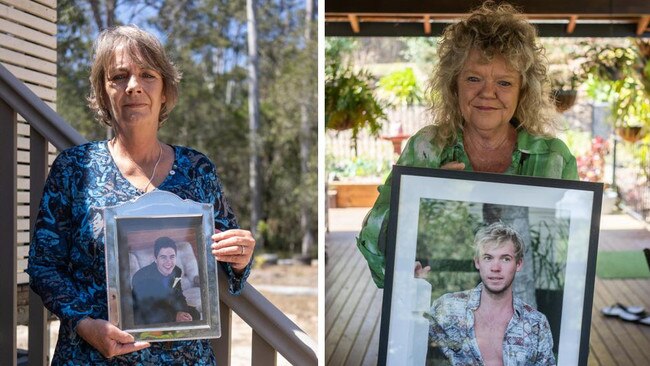Mums who lost their sons to Robodebt fear it will happen again
Kathleen Madgwick and Jennifer Miller both lost sons to Robodebt – now they fear unless more definitive action is taken by authorities, their pain could be felt by other families.
Community News
Don't miss out on the headlines from Community News. Followed categories will be added to My News.
Kathleen Madgwick and Jennifer Miller have become two of the nation’s leading advocates for lasting welfare reform after testifying in the Robodebt Royal Commission earlier this year on how their sons took their own lives after being issued with a debt.
The women have opened up about their loss to highlight their ongoing concerns that the burden of welfare debt will continue to target vulnerable individuals until real legislative change is implemented, so this “never happens again”.
Jarrad Madgwick spent most of his life between Tin Can Bay, Gympie and the Sunshine Coast playing rugby for the Gympie Devils, swimming competitively, going on overseas school trips and being a fairly popular, good-looking and kind-hearted friend.

“He liked to think himself a bit wise, and he was in a lot of ways: He really cared about life, he cared about others and he cared about justice,” his mother Ms Madgwick said.
“After he finished school he struggled to find what he wanted to do.”
It wasn’t because his options were limited, at first Jarrad started studying psychology, but didn’t like it and got a scholarship for writing instead.
“He really wanted to be a writer and was going to write a book on our family because my dad is a real larrikin – he wanted to call it The Shady Bunch, ” Ms Madgwick said.
The book was inspired by his grandfather’s moment at Gympie Magistrates Court.

He had throat cancer and wasn’t supposed to eat or drink from anything but a tube, but was caught driving under the influence of alcohol.
He managed to make the front page of the local newspaper when he told the Magistrate: “I can’t eat and drink, I simply use VB as mouthwash,” Ms Madgwick said.
But the writing scholarship was put aside when Jarrad was offered a disability support traineeship in Albury and given the chance to earn “good money”.
Unfortunately the 22-year-old was bullied at the job and decided to come back to Queensland to live with his mother, who was also struggling financially between jobs.
In May 2019, a Centrelink call came telling Jarrad he had a $2000 debt and he wouldn’t get a payment.
Stressed out, he and his mum had a heated argument after which he left, she thought, to calm down.
“Jarrad hated me being in debt, so I can only imagine what he would have been thinking,” she said.
“I would have sold this block (her house in Glenwood) to help him, but I never thought he would do anything.
“You know, he just didn't give me the time.”
Ms Madgwick said she barely remembers the days after she found him.
“I was an absolute wreck, I didn’t even know what happened. I was just throwing everything out of my house, every bit of furniture, everything, I was just was off my head,” she said.

Connecting the dots, Ms Madgwick soon realised his death was linked to his dealings with Centrelink.
In 2021 the Federal Court of Australia ruled the Commonwealth had unlawfully raised $1.73bn in debts against almost half a million people who had accessed Centrelink payments between 2015 – 2019.
In July this year a Royal Commission into the scheme found it to be “a crude and cruel mechanism, neither fair nor legal,” that “made many people feel like criminals”.
Thirty minutes south of Gympie lives Jennifer Miller, who lost her 28-year-old son Rhys Cauzzo in 2017 after he was harassed for months with a Centrelink debt of approximately $18,000.
Ms Miller flipped through photos of Rhys on her computer, photos showing a fun, good-looking boy with bleached blonde hair and a smile that draws you in.

“He moved to Melbourne in 2009 because he was very creative, loved writing music, doing his artwork and Melbourne has that vibe to it,” she said.
In May 2016 Ms Miller flew down to Melbourne to support Rhys as she noticed his mental health was deteriorating.
“That was my focus then, not the debt, because none of us knew what the debt was about,” she said.
When the police knocked on her door, she had to fly down to Melbourne to sort his things out.
“For some reason I thought I need to collate every bit of information, because this is not right, there’s something wrong here,” she said.
“That’s when I found all the debt letters and a picture on the fridge he had drawn with a gun through the mouth and dollar signs coming out his head.”

While Centrelink no longer raises debts based on an average Australian Taxation Office income (the Robodebts), debts still can be occurred through “other income information”, the Services Australia website informs.
It goes on to say that if welfare recipients do not take action to pay back the amount, Centrelink can extract it from their tax refund, charge interest from the due date, withhold Centrelink payments, and has the authority to “garnish your bank account, or your income from employment”.
In April 2023, Services Australia ceased employing debt collectors and a spokesperson from the organisation said debt recovery “is now managed in-house by highly skilled and empathetic staff who understand individual customer circumstances.”
“We know there is still more to do. We’ll resolutely apply every learning to make our agency stronger and geared to best support the Australians we serve,” the spokesperson said.
While 57 recommendations listed from the Royal Commission brought answers to both mothers, they said justice can only be served when criminal and civil prosecutions are laid against those responsible and real legislative change is implemented which prevents onerous debt falling on vulnerable welfare recipients.
The Federal Government has been contacted for comment.




